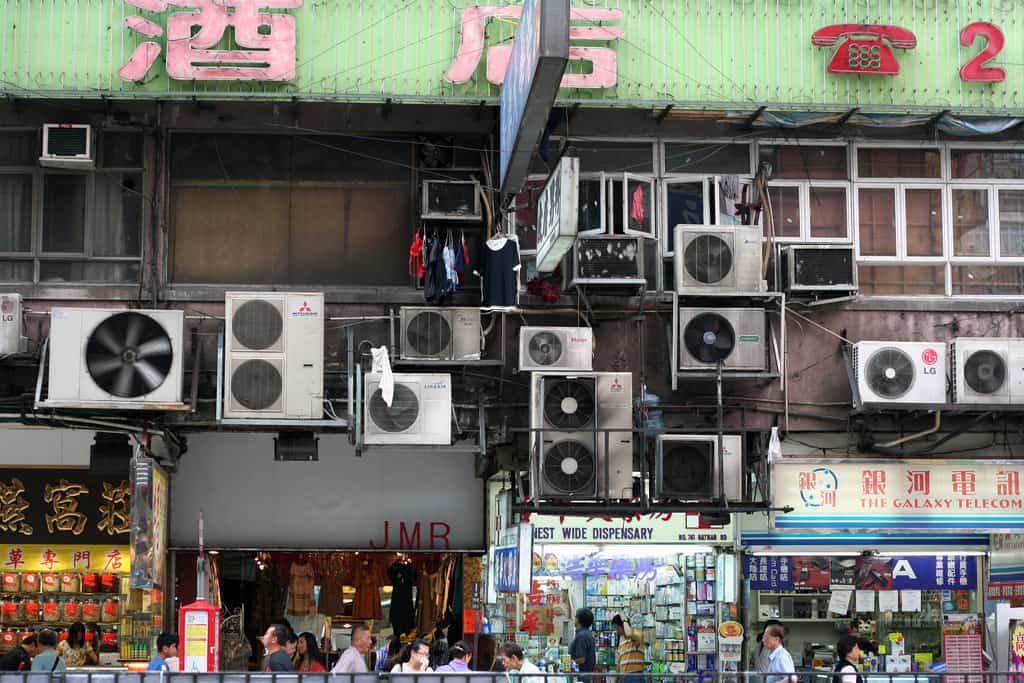The heat of the summer is on. It is so hot these days, planes can’t even take off. So it makes sense that across the country, air conditioning units are humming along, making this weather just a little more bearable.
Unfortunately, those same units might also be making this weather just a little bit worse.
There are a few things that immediately come to mind when I think about environmental pollution: vehicle exhaust, industrial waste, coal plants, littering. But air conditioning?? It is something I have always taken for granted and always taken as necessary.
But air conditioning is not a necessity. It is a luxury. It is something that billions around the globe cannot afford, and perhaps one that the world itself cannot afford.
*****
I never gave much thought to air conditioning until I moved into the tropics. Despite the round-the-year heat in Nicaragua, air conditioning is nowhere near as ubiquitous as it is in the US (where 87% of homes have AC). For example, none of my co-workers have AC in their houses, and on the hottest days, common watercooler talk revolves around the difficulty of sleeping through a steamy night.
Thus, on a recent reading of Laudato Si’, a papal encyclical about the environment and care for our common home, one paragraph jumped out at me:
“People may well have a growing ecological sensitivity but it has not succeeded in changing their harmful habits of consumption which, rather than decreasing, appear to be growing all the more. A simple example is the increasing use and power of air-conditioning. The markets, which immediately benefit from sales, stimulate ever greater demand. An outsider looking at our world would be amazed at such behaviour, which at times appears self-destructive.” Laudato Si’ 55. (emphasis added)
Air conditioning: a harmful habit of consumption? Self-destructive? Those were not my typical word associations.
*****
Air conditioning runs on power, and unless you are getting your power from a renewable energy source, your AC is polluting the environment. And AC units require a lot of energy: a typical room AC unit uses 10-20 times as much electricity as a ceiling fan.
Energy usage (and its accompanying cost) is the main reason cited by my co-workers for not buying an AC unit for their house. While the unit itself is not necessarily cost-prohibitive (similar to saving up to buy a TV or a smartphone), the monthly energy costs add up, and they come around every month. This recurring cost is particularly challenging for people in a hot tropical country in the developing world (or a low-income family in the U.S. Deep South, for that matter). Thus the conception in Nicaragua that air conditioning is NOT a necessity: it is a luxury.
Air conditioning used to be worse for the environment. AC units used to use chlorofluorocarbons (CFCs) as a refrigerant, which contributed to the damage in the ozone layer. Those have since been phased out to lower the environmental impact. Additionally, the AC units we make these days are increasingly more energy efficient, which means they are polluting less. Less CFCs, more energy efficient… sounds like we are making progress, right?
Not exactly. Consider this: sales of luxury items correlate with rising incomes. So not surprisingly, air conditioning sales in India and China have exploded recently as incomes have risen in those countries. For example, sales of AC units in China alone have doubled in the past five years. Roughly 60 million air conditioners are sold in China annually – EIGHT TIMES the quantity sold annually in the US! While the AC units might pollute less and use energy better, this is more than offset by the dramatically increasing quantity of AC units being sold and used around the world.
It has also been hot and getting hotter. Our use of AC in our homes fluctuates with the weather – no one is turning on their AC during a Minnesota winter. With global temperatures hitting record highs the past few years, AC use has likewise increased. World energy use for cooling has outstripped the energy used for heating.
It makes sense: who can endure 110 degree heat?? That level of heat is dangerous and even life-threatening. A heat wave in India in 2015 led to roughly 2,500 heat-related deaths. In an increasingly hotter planet, air conditioning can be a life-saver. But if it is contributing to heating the planet, does that balance out?
*****
We cannot abandon AC altogether, and that is not what I want to propose. (I will leave that suggestion to this writer in the Washington Post.) But we need to reflect more on our use of this energy-consuming luxury item. Let me offer three suggestions toward that end:
- Evaluate the spaces that you occupy every day. We spend hours every day in our home and the place where we work. How energy-efficient is their design? Is there good air flow? Ventilation? When I picture the typical US office building, I imagine sealed concrete boxes filled with rows of cubicles: work spaces that only function in the summertime heat because of air conditioning (can you even imagine those without AC??). Why do we design buildings that way? Because we take AC for granted. We should not. We need to design for better energy efficiency. Our designs have improved (like the many LEED certified buildings), but more work remains. Start with your own home and consider getting a home energy consultation.
- If you use AC less, you will need it less. That’s science. Your temperature preferences depend on your temperature history, which is to say, if you are used to warmer temperatures, you tolerate and even prefer warmer temperatures. Many Americans become accustomed to living between 68-72 degrees, which is why we use a lot of summertime AC and a lot of wintertime heating. That is not the case around the world (many Europeans are dumbfounded by the amount of AC use in the US). Use it less and you will find yourself preferring it less.
- Advocate for more renewable energy in the power grid. Did you know that in 2016 Costa Rica got 98% of its electricity from renewable sources? While the country has some geographic and demographic advantages, this accomplishment should at least suggest that such a reality is possible. For pointers on how to advocate for change, use tools like the Catholic Climate Covenant where you can sign up for action alerts and get advice on how to get more involved. Sign their St. Francis/Laudato Si’ pledge to commit to living out the vision of the Pope’s encyclical concerning our care for our common home.
*****
The increase in AC sales across the world, accompanied by rising global temperatures, has caused a vicious cycle. We need AC more than ever, but we also need to cut our energy use more than ever.
Only a renewable energy power grid will rid us of the dangerous environmental costs of AC use. Until then, we need to reflect on how we design and cool the spaces we occupy, how much we depend on AC for temperature control, and how we can advocate for more of the change that the world needs.
We can’t afford not to.
***
Image courtesy FlickrCC user Niall Kennedy.


